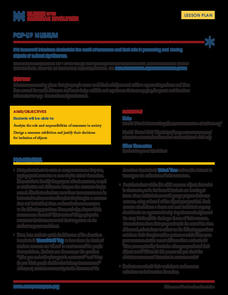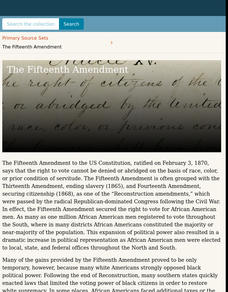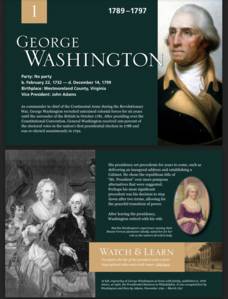DocsTeach
Analyzing a Photograph of Sally Ride
Sometimes, a picture really does say it all. The activity uses a picture of astronaut Sally Ride to help elementary academics make observations and form conclusions. Young historians study the picture, complete short written prompts, and...
DocsTeach
Analyzing a Letter About Ford Pardoning Nixon
Out of the mouth of babes ... often times comes gems. The activity uses a letter written by a third-grader in 1974 regarding President Ford's pardon of Richard Nixon. Scholars analyze the letter, complete a worksheet, and participate in...
Facing History and Ourselves
After Charlottesville: Contested History and the Fight against Bigotry
History doesn't always reflect all sides. Academics discover how the remembered history of the Civil War differs for White and African Americans. The lesson explores how Civil War monuments and celebrations have racist connotations for...
Museum of the American Revolution
Object Observation: Purpose on a Powder Horn?
Young archeologists discover the significance of ordinary objects from the past in an interesting lesson on artifact analysis. The activity focuses on examining the image of a powder horn from the Revolutionary War to understand what it...
Museum of the American Revolution
Pop-Up Museum
Museums offer more than interesting exhibits—they are key to keeping history alive. An immersive activity uses a virtual field trip to show academics the importance of museums in preserving history. Young historians learn how museums are...
Museum of the American Revolution
George vs. George
It's George versus George in the battle for the American colonies. An interesting activity compares the leadership of George Washington and King George III during the American Revolution. Scholars read text, compare portraits, and...
Museum of the American Revolution
People of the Revolution
It's nothing new—America has always been a melting pot of cultures. The resource explores the diversity of individuals living in the American colonies during the Revolutionary War. Scholars examine artifacts and primary sources to...
Museum of the American Revolution
Dunmore's Declaration
To fight or not to fight, that is the question. A thought-provoking activity focuses on the Dunmore Declaration that promised to free enslaved people who chose to fight for the British during the American Revolution. Scholars read the...
Museum of the American Revolution
Dissecting the Declaration
Delve into the past to understand the issues that led to the Declaration of Independence. Academics read excerpts from the Declaration of Independence and take a virtual tour of the American Revolution Museum. The resource explains how...
Museum of the American Revolution
Hamilton Was Here: Rising Up in Revolutionary Philadelphia
Hamilton may be a hit Broadway show, but there is so much more to learn. An eight-unit resource guides young historians through the life of Alexander Hamilton and the Revolutionary War. The lessons include hands-on-activities, writing,...
Museum of the American Revolution
Through Their Eyes: Major Causes and Events of the American Revolution
Looking for an efficient way to explore the causes and results of the American Revolution? The American Revolution Museum offers a seven-lesson series to hit the highlights of this turning point, using primary sources and activities such...
National Woman's History Museum
Eleanor Roosevelt: An Agent of Social Change
First ladies often take a back seat to their husbands' policies, but Eleanor Roosevelt broke that mold. Interested historians examine primary sources written by Roosevelt, including a speech and articles. Completing a round-robin of...
National Woman's History Museum
Defying Expectations: Unsung Hero: Marsha P. Johnson and the Stonewall Riots
The 1960s were a turbulent time, but the charismatic figure of Marshal P. Johnson is often left out of the provocative stories of the era. With primary sources that talk about Johnson and her role in the Stonewall Riots, scholars unpack...
National Woman's History Museum
Helen Keller--Citizen and Socialist
Do history books tell the full story of Helen Keller? The sanitized version of Helen Keller found in most textbooks leaves out her most provocative ideas. She was a socialist, fought for workers' rights, and advocated for the use of...
National Woman's History Museum
Unsung Voices: Black Women and Their Role in Women's Suffrage
Reclaim perspectives often left out of the narrative about the suffrage movement with an activity that lifts up the voices of African American women. Using primary sources and biographical details of Fannie Barrier Williams' life, young...
National Woman's History Museum
Red Power Prevails : The Activism, Spirit, and Resistance of Native American Women
Native American women powered the American Indian Movement and other social changes, but they are often forgotten by history books. Examining a series of resources, including a documentary film, photographs, secondary sources, and social...
Digital Public Library of America
Frederick Douglass and Abraham Lincoln
Frederic Douglass and Abraham Lincoln, although dissimilar in their backgrounds, were united in their views about slavery. A set of 14 primary sources permits scholars to examine the views of these two powerful men.
Digital Public Library of America
Ida B. Wells and Anti-Lynching Activism
A packet of 13 primary sources provides young historians with insight into the anti-lynching activism of civil rights Ida B. Wells. Included are images of Wells, her letters, a political cartoon, newspaper lynching announcements, and a...
Digital Public Library of America
The Fifteenth Amendment
Fifteen primary sources provide a context for a study of the Fifteenth Amendment to the United States Constitution. The packet captures the excitement for the changes promised by the amendment as well as the backlash against it.
Digital Public Library of America
A Raisin in the Sun by Lorraine Hansberry
A set of 14 primary sources provides background for a study of Lorraine Hansberry's drama, A Raisin in the Sun. Featured are images from stage productions of the play, white supremacy protests, a clip from a television interview, and...
Digital Public Library of America
Uncle Tom's Cabin by Harriet Beecher Stowe
Harriet Beecher Stowe's Uncle Tom's Cabin has generated controversy since its publication in 1852. Here is a set of 12 primary sources that capture the controversies of the times while adding dimension and depth to any study of the novel.
C-SPAN
Virtual Presidents Exhibit
Scholars get a glimpse into the lives of all 46 Unites States presidents. An engaging timeline details each president's background and time in office. LInks send pupils to a website with more in-depth information.
Museum of the American Revolution
Image Analysis: In Their Own Words
Images often convey more than words. Scholars examine political cartoons from the American Revolution to understand how images have the ability to express political ideas. Academics participate in group discussion, complete a worksheet,...
Museum of the American Revolution
The Ongoing Revolution
America: a nation that continues to change. Budding historians analyze primary sources to understand the key ideas of the American Revolution and how the country has changed over time. Scholars read text from the Declaration of...

























